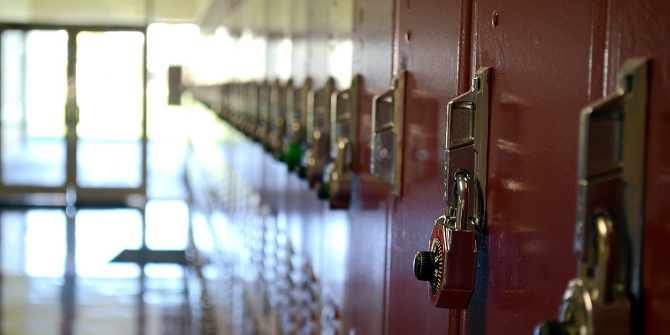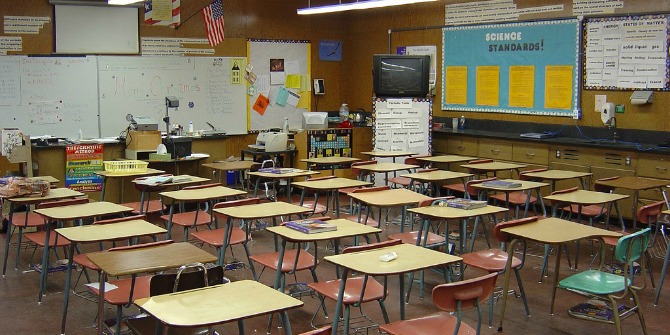
 In recent decades, there has been increasing concern over declining political participation and what many see as the thinning of American democracy. Increasing involvement in certain politically important groups and activities for children at school has been touted as one way to address this decline. But what if other school policies are also having negative effects on democratic participation? In new research which uses longitudinal data from young people, parents, and school administrators, Thomas J. Catlaw and Aaron Kupchik find that students who are suspended from school have a lower chance of civic and political participation, an effect which can last all the way into adulthood. They argue that researchers and policy workers alike would do well to take school disciplinary practices into account when considering how to deepen democracy.
In recent decades, there has been increasing concern over declining political participation and what many see as the thinning of American democracy. Increasing involvement in certain politically important groups and activities for children at school has been touted as one way to address this decline. But what if other school policies are also having negative effects on democratic participation? In new research which uses longitudinal data from young people, parents, and school administrators, Thomas J. Catlaw and Aaron Kupchik find that students who are suspended from school have a lower chance of civic and political participation, an effect which can last all the way into adulthood. They argue that researchers and policy workers alike would do well to take school disciplinary practices into account when considering how to deepen democracy.
What kind of citizenship are American schools developing today? There are two important groups of policy researchers and practitioners in the United States that try to answer this question. Unfortunately, they are not talking to each and, as our research suggests, they really need to be.
Driven by evidence that the fabric of American democracy is thinning, the first group is concerned about revitalizing civic and political life. These people think about how to get more people involved in public life, to remedy the visible and invisible barriers to involvement, and to build the institutional and individual capacity for meaningful civic and political engagement. Schools figure prominently in these efforts. Researchers have found that participation in certain “politically salient” groups and activities at school—rather than education in civics per se—can help to develop the inclination and ability to participate in political and civic life.
The second group looks at policing and security within schools and the ways in which students are disciplined. These people are concerned about the effects of growing police and surveillance presence in schools and the harsh punishments meted out, such as those that follow from zero tolerance and mandatory arrest policies. Researchers find that that the overreliance on exclusionary school punishment (i.e., removing students from schools) and criminal justice-oriented security (e.g., police in schools, drug-sniffing police dogs) have a host of negative consequences: increase of racial inequality, alienation of students from school, and encouragement of docility and deference towards adult authority.

Clearly, these two policy trends are intertwined and, it seems to us, at cross-purposes. One might reasonably guess that efforts to reignite the political and civic imaginations of youth and to develop their abilities to participate in democracy are hindered by school disciplinary practices that physically remove students and socialize them to be docile and compliant in front of authority. These practices would not seem to develop the individual skills needed to participate in democratic life, like dialogue and collaborative problem solving. In short, any efforts schools might be making to develop the personal efficacy for and interest in political and civic engagement might be undone by the disciplinary practices within these very same schools. Surprisingly, though, there is little conversation among these policy communities and, to the best of our knowledge, no empirical research at this intersection.
In new research, we set out to better understand the long-term effects of contemporary school punishment and security on the political and civic engagement. Are school-place disciplinary practices working against or even eroding the political efficacy of young Americans? We find that they are.
We used data from the National Longitudinal Survey of Adolescent Health (Add Health), a large, nationally-representative longitudinal dataset which is compiled by the University of North Carolina (UNC) Population Center and funded by a number of federal agencies. These data are especially useful to address our question since they include interviews of youth, school administrators, and parents during the 1994-1995 school year, when a nationally-representative sample of adolescents were in Grades 7 to 12. The study follows up with them multiple times, through a fourth round of interviews, completed in 2007-2008. The data also allowed us to control for a wide range of community, school, and individual level factors that have been shown to shape political and civic behavior. We define “political and civic behavior” in fairly traditional terms: voting, registration to vote, and engagement in unpaid volunteer work.
We find that suspension, in particular, is a politically salient school disciplinary practice. Prior research on schools clearly shows that when used too frequently, suspension is an ineffective, often counter-productive strategy for improving both school discipline and educational outcomes. Our research suggests another negative consequence: It suppresses future political and civic participation. Youth who are suspended have lower odds of future civic and political participation and the effect lasts beyond the young adult years and into adulthood. Interestingly, we did not find evidence that the intensity of the effect of suspension varies significantly by race or ethnicity. However, since youth of color are suspended at disproportionately high rates, they bear the brunt of the practice’s negative consequences for political and civic engagement.
What is it about suspension that suppresses civic and political engagement? We think that suspension teaches students a lesson about authority and their powerlessness relative to governing bodies. To the extent that students learn this lesson and apply it to their future roles as citizens, they may be less likely to vote and volunteer because they simply are not socialized to see themselves as people capable of actively shaping governance or community life.
This does not mean, of course, that students should not be punished. When students violate laws, rules, or social norms, disciplining them can be important both for the community and the student’s own personal development. But we need to be smarter about the kinds of punishments we use and think through the consequences of our practices. This is particularly so when we realize that most suspensions are for minor misconduct such as “disorderly conduct” or “insubordination” (i.e., mouthing off to a teacher). Not only is the frequent use of suspension in response to minor misbehavior a losing educational strategy, it appears to have negative long-term consequences for our democracy writ large. To this point, researchers and policy workers concerned about deepening democracy among American youth would do well to take discipline and security practices into account and re-examine the scope of what counts as “politically salient” school place activities. Together, these two communities might put us back on the path to building healthy schools that help youth to live and practice the active democratic citizenship we say we want from them as adults.
This article is based on the paper, ‘Discipline and Participation The Long-Term Effects of Suspension and School Security on the Political and Civic Engagement of Youth’, in Youth and Society.
Please read our comments policy before commenting.
Note: This article gives the views of the author, and not the position of USApp– American Politics and Policy, nor of the London School of Economics.
Shortened URL for this post: http://bit.ly/1MOUkRY
_________________________________
 Aaron Kupchik – University of Delaware
Aaron Kupchik – University of Delaware
Aaron Kupchik is a Professor and the Director of Graduate Studies in the Department of Sociology and Criminal Justice at the University of Delaware. He is author of Homeroom Security: School Discipline in an Age of Fear (NYU Press, 2010) and Judging Juveniles: Prosecuting Adolescents in Adult and Juvenile Courts (NYU Press, 2006).
 Thomas J. Catlaw – Arizona State University
Thomas J. Catlaw – Arizona State University
Thomas J. Catlawis Associate Professor and Frank and June Sackton Chair in Public Administration in the School of Public Affairs at Arizona State University in Phoenix. He is the author of Fabricating the People: Politics and Administration in the Biopolitical State (University of Alabama Press, 2007) and Theories of Public Organization (with Robert Denhardt, Cengage, 2014).






